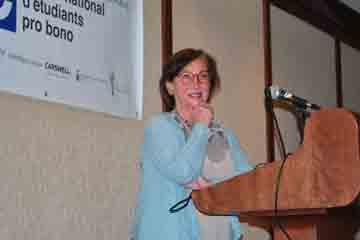

A well-recognized Canadian judge has another accolade on her list of accomplishments — the fact she’s now been named the global jurist of the year by Northwestern University.
Justice Rosalie Silberman Abella will receive the award later this month in Chicago, as the fourth recipient of the annual award, which goes to a sitting judge.
Previous recipients include Gloria Patricia Porras Escobar of the Guatemalan Constitutional Court, Justice Shireen Avis Fisher of the Special Court for Sierra Leone, and Acting Chief Justice Dikgang Moseneke of South Africa’s Constitutional Court.
“Justice Abella has long been recognized internationally as one of Canada’s foremost jurists,” said Adam Dodek, a law professor at University of Ottawa. “This award confirms that long and widely-held view.”
The award is on behalf of the Northwestern Pritzker School of Law’s Center for International Human Rights.
“Justice Abella’s extraordinary personal story and her outstanding professional achievements really make her a compelling figure, someone who is well-worthy of this honour and someone who we are very excited to welcome to Northwestern Law School to have the chance for our students and faculty to interact with her, and hear from her,” says Juliet Sorensen, the centre’s Harry R. Horrow Professor of International Law, who was part of the four-person selection committee who chose Abella for the award. Sorenson says Abella was nominated for the honour.
Abella —who graduated from University of Toronto with a bachelor of arts and a law degree — will speak on January 25 at Northwestern about whether international law has kept up with the world.
“Abella is a pioneer in many ways. She is the first Jewish woman and the youngest person ever appointed as a judge in Canada,” said the news release from Northwestern announcing the award. “She also is the first Jewish woman appointed to the country’s Supreme Court.
Born in a displaced persons’ camp in Stuttgart, Germany, in 1946, Justice Abella is the daughter of two Holocaust survivors.”
A biography on the Supreme Court of Canada’s website notes Abella was appointed to the Ontario Family Court in 1976, and the Ontario Court of Appeal in 1992. She joined the Supreme Court in 2004.
“She was the sole Commissioner of the 1984 federal Royal Commission on Equality in Employment, creating the term and concept of ‘employment equity,’” says the biography. “The theories of ‘equality’ and ‘discrimination’ she developed in her Report were adopted by the Supreme Court of Canada in its first decision dealing with equality rights under the Canadian Charter of Rights and Freedoms in 1989.”
Eugene Meehan, a lawyer at Supreme Advocacy in Ottawa, said Abella is well-known for various decisions, including the recent SCC decision in Daniels v. Canada (Indian Affairs and Northern Development), where Meehan said Abella “wrote the unanimous judgment of the Court that government is to constitutionally recognize the rights of Métis and non-status Indians.”
“Justice Abella is now the second most senior judge on the court,” said Meehan. “Though some try to peg her as being of this or that school of thought, on this or that issue, the reality is she’s a chameleon that’s able to muster majorities among different groups of allies – yet still feel strongly enough on issues of importance to her to write the lone wolf dissent.”